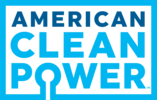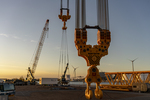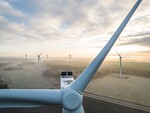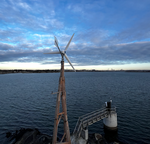News Release from American Clean Power Association (ACP)
Wind Industry Profile of
01/29/2011
AWEA - The best of AWEA’s recent Best-Practices conference
The recent AWEA Wind Project Performance & Reliability Workshop provided two days of presentations from wind-farm owners, operators, turbine manufacturers, and experts from the national laboratories on how best to ensure the successful operation and maintenance of wind projects. We’ve picked the six best presentations in the bunch and present them here.
As a backdrop to them, nearly $40 billion worth of wind installations in the U.S. will be out of warranty in 2011, thrusting the financial risk on their owners to provide cost-effective operation and maintenance. The U.S. will require more than 100,000 additional wind turbines to supply 20% of the nation’s electricity over the next 20 years. The industry must develop, document, and share best practices and lessons learned for operating wind projects profitably. The PowerPoint slides from the presentations deal with those issues. Click on any of the headlines to download the presentation slides.
What gets measured gets done, says service firm:
As a third-party service provider for wind energy projects, UpWind Solutions says no financial ties to OEMs let it create long-term, beneficial relationships that align its interests with wind-farm owners. The company operates and manages wind energy projects in every region of the U.S. and offers a range of services for wind turbine technologies. The company adds that it operates two of the highest performing wind farms in North America, and over 300 MW in excess of 98.5% availability. The presentation deals with wind industry metrics. For example, the company tells of the top five drivers for safety, quality, and increasing commercial availability. The latter, for example, includes:
1. A sense of urgency and response time
2. A data driven approach and statistical analysis
3. Inventory management
4. Root-cause analysis
5. A flexible work force and resource planning
The presentation also lists the top five drivers to lower cost/kWh.
How will your crew climb those really tall towers?
You and lift-assist manufacturer Avanti know wind turbine towers are getting higher, where the wind is stronger and steadier. The company says most towers today are prepared for 80 meter hub heights with 100-m towers now in production. The company has several ideas for getting crews and equipment up to those heights without wearing them out.
Balance of plant maintenance planning:
Wind energy is renewable, but only if wind generators are in good repair. Shermco Industries says it has a team that can keep wind generators running at top capacity. Its presentation tells how.
Better blades produce more power:
The rotor blades represent 20% of the investment in an onshore wind turbine. Sustaining and increasing the performance of the rotor is the most direct way to influence the cost of energy and therefore the turbine’s annual energy production. An increase of 4 to 5% in annual-energy production over the normal, 20 year lifespan of the wind turbine pays for the blade set (i.e. 20% of the investment in an onshore wind turbine). The presentation by blade-service company LM Wind Power shows how that is done.
Metrics identify what’s normal, what’s recoverable:
Metrics for identifying a turbine’s normal performance and what it could be doing are found in four characteristics: windiness, downtime, availability, and performance, according to AWS Truepower. The company identifies an energy-to-speed ratio (EVR) as a measure of a site’s sensitivity to variations in wind speeds. High wind-speed regions have a lower EVR on average. Improper use of site specific EVR could cause significant bias in monthly energy budgets – potentially driving further analysis for energy that is not recoverable. The presentation addresses making sense of a range of wind-farm variables.
Keeping good turbines from going bad:
There are good reasons for installing vibration analysis equipment in each turbine, says turbine-manufacturer Suzlon. For example, it gives detailed real-time analysis of drive train components, long-term trending of individual turbines, FFT (fast Fourier transforms) for each turbine, and it allows detecting failures early. The presentation covers other benefits and challenges to vibration-analysis equipment.
For more information on this article or if you would like to know more about what www.windfair.us can offer, please do not hesitate to contact Errol Stryker (Sales Manager North America) at es@windfair.us
www.windfair.net is the largest international B2B Internet platform – ultimately designed for connecting wind energy enthusiasts and companies across the globe!
As a backdrop to them, nearly $40 billion worth of wind installations in the U.S. will be out of warranty in 2011, thrusting the financial risk on their owners to provide cost-effective operation and maintenance. The U.S. will require more than 100,000 additional wind turbines to supply 20% of the nation’s electricity over the next 20 years. The industry must develop, document, and share best practices and lessons learned for operating wind projects profitably. The PowerPoint slides from the presentations deal with those issues. Click on any of the headlines to download the presentation slides.
What gets measured gets done, says service firm:
As a third-party service provider for wind energy projects, UpWind Solutions says no financial ties to OEMs let it create long-term, beneficial relationships that align its interests with wind-farm owners. The company operates and manages wind energy projects in every region of the U.S. and offers a range of services for wind turbine technologies. The company adds that it operates two of the highest performing wind farms in North America, and over 300 MW in excess of 98.5% availability. The presentation deals with wind industry metrics. For example, the company tells of the top five drivers for safety, quality, and increasing commercial availability. The latter, for example, includes:
1. A sense of urgency and response time
2. A data driven approach and statistical analysis
3. Inventory management
4. Root-cause analysis
5. A flexible work force and resource planning
The presentation also lists the top five drivers to lower cost/kWh.
How will your crew climb those really tall towers?
You and lift-assist manufacturer Avanti know wind turbine towers are getting higher, where the wind is stronger and steadier. The company says most towers today are prepared for 80 meter hub heights with 100-m towers now in production. The company has several ideas for getting crews and equipment up to those heights without wearing them out.
Balance of plant maintenance planning:
Wind energy is renewable, but only if wind generators are in good repair. Shermco Industries says it has a team that can keep wind generators running at top capacity. Its presentation tells how.
Better blades produce more power:
The rotor blades represent 20% of the investment in an onshore wind turbine. Sustaining and increasing the performance of the rotor is the most direct way to influence the cost of energy and therefore the turbine’s annual energy production. An increase of 4 to 5% in annual-energy production over the normal, 20 year lifespan of the wind turbine pays for the blade set (i.e. 20% of the investment in an onshore wind turbine). The presentation by blade-service company LM Wind Power shows how that is done.
Metrics identify what’s normal, what’s recoverable:
Metrics for identifying a turbine’s normal performance and what it could be doing are found in four characteristics: windiness, downtime, availability, and performance, according to AWS Truepower. The company identifies an energy-to-speed ratio (EVR) as a measure of a site’s sensitivity to variations in wind speeds. High wind-speed regions have a lower EVR on average. Improper use of site specific EVR could cause significant bias in monthly energy budgets – potentially driving further analysis for energy that is not recoverable. The presentation addresses making sense of a range of wind-farm variables.
Keeping good turbines from going bad:
There are good reasons for installing vibration analysis equipment in each turbine, says turbine-manufacturer Suzlon. For example, it gives detailed real-time analysis of drive train components, long-term trending of individual turbines, FFT (fast Fourier transforms) for each turbine, and it allows detecting failures early. The presentation covers other benefits and challenges to vibration-analysis equipment.
For more information on this article or if you would like to know more about what www.windfair.us can offer, please do not hesitate to contact Errol Stryker (Sales Manager North America) at es@windfair.us
www.windfair.net is the largest international B2B Internet platform – ultimately designed for connecting wind energy enthusiasts and companies across the globe!
- Source:
- American Wind Energy Association
- Author:
- Posted by Trevor Sievert, Online Editorial Journalist
- Email:
- windmail@awea.org
- Link:
- www.awea.org/...
- Keywords:
- AWEA; wind energy, wind power, wind turbine, onshore, offshore, windmill, www.windfair.net, Trevor Sievert, ECA


























